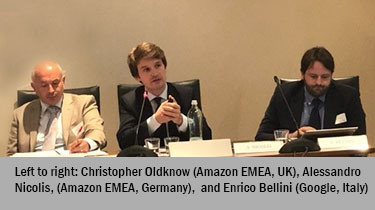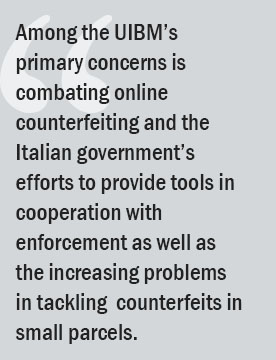INTA Policy Dialogue in Milan, Italy, Offers Anticounterfeiting Remedies for the Digital Age
Published: September 1, 2019
 INTA, together with the Italian Ministry of Economic Development (UIBM) and the Associazione Italiana per la Lotta alla Contraffazione (INDICAM), held a policy dialogue on July 2, in Milan, Italy, on online and offline counterfeiting. The event featured speakers from the intellectual property (IP) industry, government agencies, and online and social media fields. This was the second such event under INTA’s Memorandum of Understanding with the Italian Intellectual Property Office (UIBM), which focuses on supporting anticounterfeiting efforts in Italy.
INTA, together with the Italian Ministry of Economic Development (UIBM) and the Associazione Italiana per la Lotta alla Contraffazione (INDICAM), held a policy dialogue on July 2, in Milan, Italy, on online and offline counterfeiting. The event featured speakers from the intellectual property (IP) industry, government agencies, and online and social media fields. This was the second such event under INTA’s Memorandum of Understanding with the Italian Intellectual Property Office (UIBM), which focuses on supporting anticounterfeiting efforts in Italy.
UIBM recently announced that a growth decree on “Urgent measures for economic growth and for the resolution of specific crisis situations” was converted into law and entered into force at the end of June. The law makes two references to the protection of industrial property in Chapter III (Art. 31 on the protection of Italian historical marks and Art. 32 laying down measures for the fight against the so-called “Italian-sounding” phenomenon). The law also provides for incentives for small and medium-sized companies to file patents and trademarks. UIBM also noted that it will be collaborating with the World Intellectual Property Organization and the International Chamber of Commerce of Italy on a workshop to be held on September 17 in Naples, Italy, on Intellectual Property as a Strategic Asset for SMEs and Start-Ups.
Panel Discussions
UIBM Head of Anticounterfeiting Policies Francesca Cappiello led the first panel discussion by focusing on UIBM’s top priorities, which include awareness campaigns, harmonization of regulations, and enforcement initiatives for trademarks and IP rights. Among the UIBM’s primary concerns is the Italian government’s efforts in cooperation with enforcement to provide tools to combat online counterfeiting, and the increasing problem of counterfeits in small parcels.
INTA Anticounterfeiting Manager Maysa Razavi stressed the importance of cooperation between the private and public sectors and the need to educate young consumers on the danger of counterfeits. Ms. Razavi presented an overview of INTA’s recently released global study, Gen Z Insights: Brands and Counterfeit Products, which explores the relationship between Gen Zers and brands, and their attitudes regarding counterfeit products. Italy was one of the ten countries featured in the study. Among key findings in Italy, 84% of respondants said that a brand name is not as important as how a product fits their needs, and 79% said that brands should aim to do good in the world.
INDICAM President Mario Peserico highlighted the increasing importance of online marketplaces and intermediaries as active parties to combat online counterfeiting and the need for legislators to regulate and harmonize domestic and international laws to meet the new needs of brand owners and stakeholders. He noted that INDICAM aims to promote initiatives for anticounterfeiting, including developing and spreading technologies designed to prevent any counterfeiting activity, to grant authenticity certificates, and to provide security for buyers.
 UIBM Head of International Affairs Simona Marzetti next moderated a panel discussion focused on the public sector’s perspective on combating counterfeits. Government officials and enforcement authorities shared best practices and strategies to deprive commercial-scale infringers of their revenue flows, as well as new trends in online IP rights infringements.
UIBM Head of International Affairs Simona Marzetti next moderated a panel discussion focused on the public sector’s perspective on combating counterfeits. Government officials and enforcement authorities shared best practices and strategies to deprive commercial-scale infringers of their revenue flows, as well as new trends in online IP rights infringements.
Guardia di Finanza Special Unit for Good and Service Commander Salvatore Paiano provided an overview of the agency’s strategies in tackling counterfeits. Guardia di Finanza is an economic police body whose priority is to focus on online and offline investigations and to coordinate operations with EUROPOL and other European investigation agencies. Mr. Paiano explained that Guardia di Finanza has implemented an operative system called Sistema Informativo Anti-Contraffazione (Anti-Counterfeiting Information System), through which brand owners can register and provide products’ information and cooperate with the enforcement agency for investigation.
Autorità per le Garanzie nelle Comunicazioni (AGCOM) Deputy Director Giorgio Greppi highlighted AGCOM’s role in tackling online piracy and ensuring fair market competition and protecting the rights of all citizens in the communications and postal sectors.
The second panel focused on solutions and tools to prevent and fight online infringements, as well as trends and results following the European Commission’s recommendations to tackle illegal content online and emerging issues. Claudio Bergonzi, Secretary General of INDICAM, moderated the panel discussion.
Speakers Laura Bononcini (Facebook, Italy), Daniel Dougherty (Alibaba Group, USA), Christopher Oldknow (Amazon EMEA, UK), Alessandro Nicolis (Amazon EMEA, Germany), and Enrico Bellini (Google, Italy) detailed numerous policies for take down notices and efforts to prevent or stop the sale of counterfeit products online. They also provided tips and best practices to guide brands faced with IP rights violations. Panelists agreed that proactivity, transparency, and cooperation are key factors in these efforts.
The final group of panelists shared its experience in the field of anticounterfeiting from a brand owner’s perspective. INTA Anticounterfeiting Committee Vice-Chair Myrta Hurtado Rivas (Novartis Pharma AG, Switzerland), Murielle Vincenti (Prada S.A., Luxembourg), and Simon Baggs (Incopro, UK) emphasized the importance of joining forces with the public sector, online marketplaces, and social media in order to develop a comprehensive strategy in combating counterfeits.
For more information on INTA’s anticounterfeiting activities, please contact INTA’s Anticounterfeiting Manager Maysa Razavi at [email protected], Anticounterfeiting Advisor Tiffany Pho at [email protected], or Anticounterfeiting Advisor Asia-Pacific Valentina Salmoiraghi at [email protected].
Although every effort has been made to verify the accuracy of items in the INTA Bulletin, readers are urged to check independently on matters of specific concern or interest.
© 2019 International Trademark Association
This website uses cookies so that we can provide you with the best user experience possible. Cookie information is stored in your browser and performs functions such as recognising you when you return to our website and helping our team to understand which sections of the website you find most interesting and useful.
To find out more please see our Cookies Policy and Privacy Policy.
These cookies are used to identify a user’s browser as the visitor goes from page to page on the Site. These are session cookies, which means that the cookie is deleted when you leave the Site. It is an integral piece of the Site software and used to let the server know which users are on the Site at any given time and make certain parts of the Site easier to use.
|
|
If you disable this cookie, we will not be able to save your preferences. This means that every time you visit this website you will need to enable or disable cookies again.
These cookies are used to collect information about how visitors use our Site. The cookies collect information in anonymous form, including the numbers of visitors to the Site, where visitors have come to the Site from, the pages they visited and how they have interacted with tools on the Site like search and embedded media players. We use the information to compile statistical reports of our users’ browsing patterns so that we can improve the Site.
|
|
Please enable Functionality Cookies first so that we can save your preferences!
These cookies are used to deliver advertising relevant to the interests of visitors to our Site. They are persistent, which means they will remain on your device after you leave the Site.
- Facebook (Ad Pixel)
- Google (Ad Pixel)
- LinkedIn (Ad Pixel)
- Quattro Anonymous
Please enable Functionality Cookies first so that we can save your preferences!
